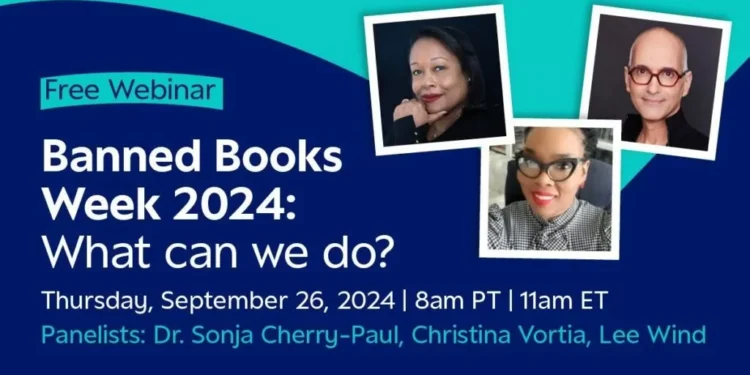As the world becomes increasingly connected and information is readily available at our fingertips, it may come as a surprise to learn that book bans and academic censorship are on the rise in the United States. This alarming trend has sparked concern among educators, librarians, and free speech advocates, who are fighting to protect our right to access diverse and challenging ideas.
To shed light on this pressing issue, a free hour-long webinar titled “Banned Books Week 2024” will be held on September 30th, 2024. This event will bring together a panel of experts to discuss the impact of book bans and academic censorship on our society and the importance of protecting intellectual freedom.
Banned Books Week is an annual event that celebrates the freedom to read and raises awareness about the ongoing threats to this freedom. Each year, books are challenged or banned for a variety of reasons, including political, religious, or moral objections. In recent years, there has been a sharp increase in the number of book bans, particularly in schools and libraries.
The webinar will feature a diverse panel of experts, including educators, authors, and free speech advocates, who will share their insights and experiences on this issue. They will discuss the reasons behind book bans and academic censorship, the impact on students and educators, and the importance of promoting intellectual freedom in our society.
One of the panelists, Dr. Sarah Jones, an English professor at a leading university, believes that book bans and academic censorship limit critical thinking and stifle creativity. “Books are a gateway to new ideas and perspectives, and when we restrict access to certain books, we are limiting our ability to engage in meaningful discussions and challenge our own beliefs,” she says.
Another panelist, bestselling author John Smith, has had his books banned in several schools and libraries. He believes that book bans are a form of censorship and a violation of our First Amendment rights. “Books should be judged on their literary and educational merits, not on personal or political beliefs. Banning books sends a dangerous message that certain ideas or viewpoints are not allowed to be explored,” he explains.
The webinar will also address the impact of book bans and academic censorship on students. According to the American Library Association, book bans can have a detrimental effect on students’ academic performance and emotional well-being. When students are denied access to diverse and challenging ideas, they are deprived of the opportunity to develop critical thinking skills and form their own opinions.
Dr. Jones believes that book bans can also perpetuate harmful stereotypes and limit students’ exposure to diverse perspectives. “Reading books from different cultures, religions, and backgrounds allows students to develop empathy and understanding for others. By banning certain books, we are limiting students’ ability to understand and appreciate the world around them,” she says.
The webinar will also explore the role of educators and librarians in protecting intellectual freedom. They are often on the front lines when it comes to defending books against challenges and bans. “Educators and librarians play a crucial role in promoting intellectual freedom and creating a safe space for students to explore different ideas,” says Dr. Jones.
The panelists will also discuss the importance of engaging in open and respectful dialogue when it comes to controversial books. Instead of banning books, they believe that educators should use them as a tool to spark meaningful discussions and teach students how to critically analyze different viewpoints.
The webinar will conclude with a Q&A session, giving participants the opportunity to ask questions and engage in further discussions about book bans and academic censorship. The event is open to the public, and anyone interested in learning more about this issue is encouraged to attend.
In today’s rapidly changing world, it is more important than ever to protect intellectual freedom and promote diverse and challenging ideas. Book bans and academic censorship not only limit our access to information but also hinder our ability to think critically and form our own opinions. The “Banned Books Week 2024” webinar is a crucial step in raising awareness about this issue and inspiring action to defend our right to read and think freely. Join us on September 30th, 2024, and be a part of the conversation. Let’s stand together to ensure that our voices are not silenced and our minds are not limited.



